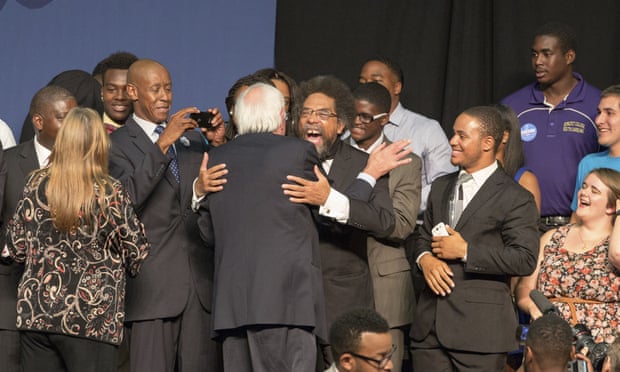| Doing my part in promoting Bernie |
These days there is a fresh new face in the democratic party, a charismatic figure that has electrified the presidential primary and attracted a youth following that is reminiscent of that of our current president, Barack Obama. I am speaking of course of the 74 years old Senator from Vermont, Bernie Sanders.
Inexplicably, this old man has become the face and voice of today's youth, a youth that is tired of the same old system, a youth tired of the status-quo and the calcified nature of the countries politics, a youth that has had enough of the wealth going to the few at the top and the rest doing worse. Bernie Sanders has come to represent the very dissatisfied and often angry youth of today that grew to political consciousness after the financial crash of 2008. Bernie Sanders' platform speaks to that dissatisfaction with the ever increasing gap between the rich and the poor that has almost reached Gilded Age levels. Their concern for income inequality matches with his rhetoric about Wall Street and the rich paying their fair share. His ideas of single payer healthcare and, healthcare as a right speaks to the generation that has grown hearing about preconditions and the very dysfunctional healthcare. His promise of free higher education that is free of the ridiculous student loans has attracted the youth to himself. In the Iowa caucuses his majority of the youth has given the Clinton campaign a serious nightmare.
There is one problem, however, that youth is very, very white.
By all metrics Bernie Sander very vocal following is comprised of mainly college educated younger European Americans, mainly male. His polling number among African Americans and Hispanic Americans are abysmal and to win the democratic primary, especially the south were the majority of democratic primary voters are black, he needs those minority votes. Sanders has struggled in attracting those voters, to the confusion his followers who seem not to understand why his radical ideas seem to not make any inroads in those communities.
 |
| Googled "Bernie Sanders with black people" for this. |
Solving income inequality is so ingrained in the Sander's theory of governance that early on is his campaign, every time he was asked a question about racism or even sexism, he would often pivot to the problem of income inequality and how by solving such problems there should be less racism and less sexism. After being protested by Black Lives Matter supporters and at a Seattle rally and at a Netroots event, he now mentions systematic racism and incarceration rate. But it is notable that Bernie Sanders began his campaign in April 2015 and did not have a civil rights platform or minority rights until August 2015, so for four month a candidate who was running for president of the United States in the Democratic party did not have a civil rights platform. It shows that once again, Bernie Sanders believes that all problems racism included comes from the current capitalistic system. His theory of governance believes that racism is a natural result of capitalism and that by reforming capitalism, problems of racism will be solved. It is his weakness because many in the African American community, and myself included believe that the problems of racism and many issues relating to the black community are not natural result of capitalism like poverty but rather artificial in the sense that a group of people was held down, abused and taken advantages solely based of their skin color and not by economic situations. It is that unnaturalness that calls for special solutions rather than cure-alls.
In the next part will be discussed how this misunderstanding by Bernie Sanders in his theory of governance, disproves his status as the radical that he claims to be and that his candidacy would truly bring change to the system.
No comments:
Post a Comment